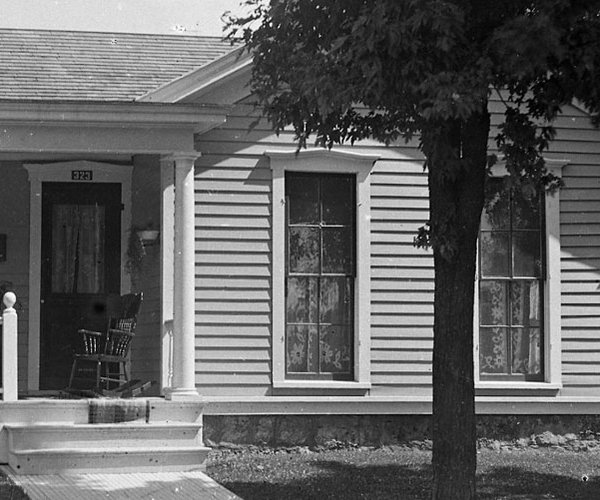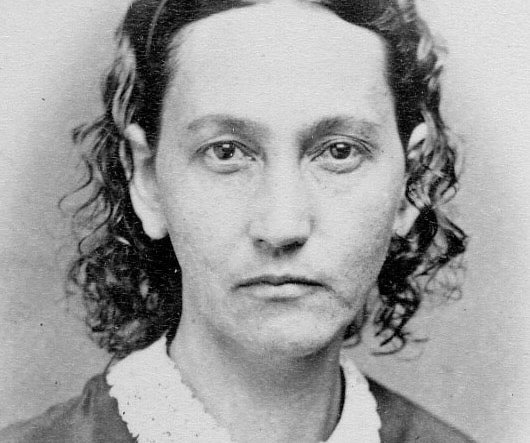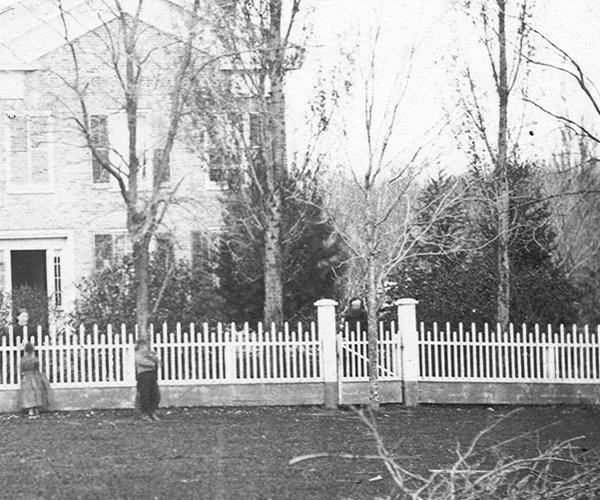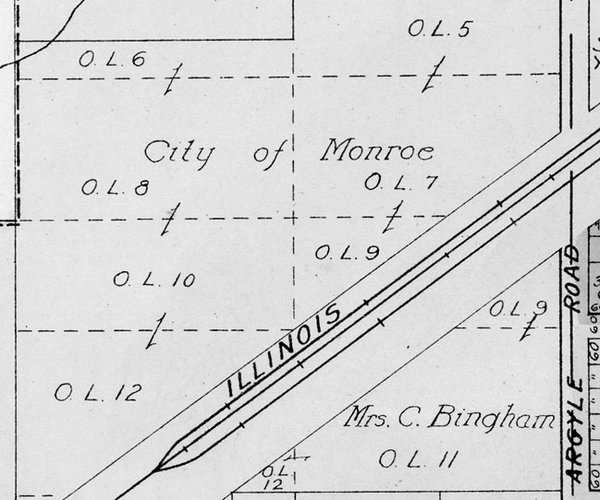The Darlington Democrat described the incident shared here best when it said that “another chapter was added to the history of Browntown” at 3:00 p.m. on Saturday, March 26, 1898. Young Wesley Stover, 13, came running downtown crying and said that his mother had just been shot and killed by Bert Watson.
The Sentinel reported on the following Wednesday that Emma Trickel-Bedford had been shot and killed by Robert Watson. Watson “was infatuated with the woman, and became suspicious of her, and, fired by the green-eyed monster, he killed without mercy the one he loved, not wisely, but too passionately. Realizing what he had done, or premeditating the second act of the tragedy — Watson shot and killed himself in the presence of the dying woman. There was but an instant of time between the two souls that fled to the Eternal to answer before a higher court for the deeds done in the body.”
Sheriff Stearns and Coroner Shriner were summoned and made the trip to Browntown immediately. An inquest was held when the coroner arrived and the results were obvious. District Attorney Clark and Doctors R. B. Clark, Will Monroe, and Mulch accompanied the sheriff and coroner to the scene. An article from an unknown newspaper stated that Mrs. Stover was found dead in bed with a bullet hole in her breast and that Watson was found in a dying condition in an adjoining room with a rifle by his side. Shriner said “The sight he beheld on entering the home of slaughter beat anything he ever saw in that line.” Mrs. Bedford was shot through the breast twice with a Winchester rifle; Watson was shot through the head with the ball entering just back of the right ear and going up through the brain and exiting on the left side of his head. The ball was lodged in the ceiling.
Watson’s father, a wealthy farmer from near South Wayne, was present at the inquest and “behaved in a very unseeming manner, attempting to bulldoze the coroner and the undertaker, and even the physicians and women who were assisting the undertaker in preparing the bodies for removal.” The Sentinel also said, “Enough is known to warrant the conclusion that Watson was crazed by strong drink, that he was wrought up to a frenzy of jealousy by the actions of the woman he murdered, that they had been quarreling frequently of late, on account of her conduct with another man; that Watson had threatened to kill her, and evidently had prepared to do so at the time he did the deed, and also was armed to resist arrest before he accomplished his purpose. Browntown officers were notified of his threats and were afraid to arrest the desperate character who defied them to do so. Strange enough, the woman did not attempt to get away from her house. Both were in Monroe on Friday, and on Friday night the quarrel began which ended with the tragedy on Saturday afternoon.”


The Sentinel stated on March 30 that young Wesley “was driven insane by the tragedy which he witnessed, but it is hoped that he may recover after the nervous shock has passed — in time.” Wesley had a younger brother, Edward, 10, who had not witnessed the murder.
Mrs. Bedford’s funeral was held from her mother’s home on Monday afternoon. Rev. T. J. Morgan was the preacher and a choir from Winslow sang. She was interred beside her father, Robert Wesley Trickel, who had passed away four years earlier, at the Kelly cemetery just west of Monroe. Tombstones of many members of her Kelly-Morton family now surround her small stone.
Watson was buried in South Wayne at the same time. An article from the Freeport paper shared, “It is considered fortunate that Watson ended his own life. He had sworn never to be taken alive. The house where he committed his crime stood on an eminence commanding all the approaches there to and if a posse had been intent on capturing him he could have shot them down one by one. Watson had traveled much. From the rough riders of the west he had learned to handle the bowie knife and pistol with dexterity. He always was armed to the teeth and he possessed, beside the usual weapon, a sling shot, which he could manipulate as well as David of old.”
The Freeport Daily Bulletin reported that Harrison Boyd, of Polo, was passing through the city on April 5 after he had attended the Bedford funeral. “He had with him the bullet that passed through the woman’s body. It was found imbeded [sic] in the floor of the house in which the murder occurred.”
Two days later the same newspaper stated that a man from Browntown shared some “unpublished facts” about Mrs. Bedford, who was “possessed of considerable wealth.” In exploring her home “more than $1,000 was found in a secret place and it is believed that there is other money hidden about the premises.” It added that she was “said to have possesed [sic] a charming personality and was especially brave for one of her sex. She kept a six shooter which she knew perfectly well how to use. Had this been in reach she certainly would have made use of it before Watson accomplished his deed.”
It went on to say that Watson “was a man of powerful build. He was greatly in love with Mrs. Bedford with whom he had made his home and the certain knowledge that she had transfered [sic] her affections to another was what caused him to slay her. He appeared to think that if he was not to have her love, no man was. It was evidently the man’s intention to kill both the woman and his rival but the alarm given by the child upset his plans and so he put a bullet into his brain and fell dead beside the one he loved, while the man who had innocently caused all the trouble chatted in the village store near by.”
In the next column, we shall find out what happened to Emma’s mother, her sons, and her ex-husbands.
— Matt Figi is a Monroe resident and a local historian. His column will appear periodically on Saturdays in the Times. He can be reached at mfigi48@tds.net or at 608-325-6503.





